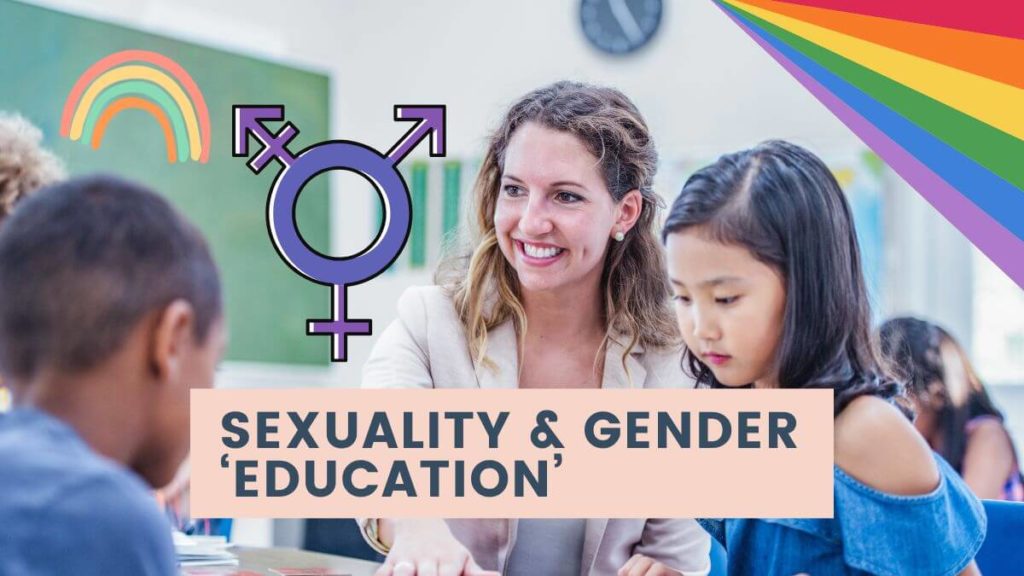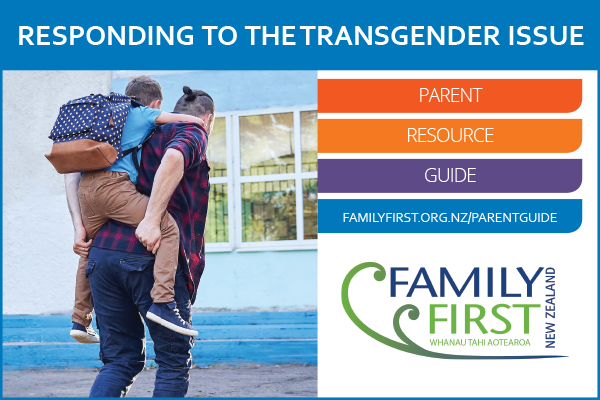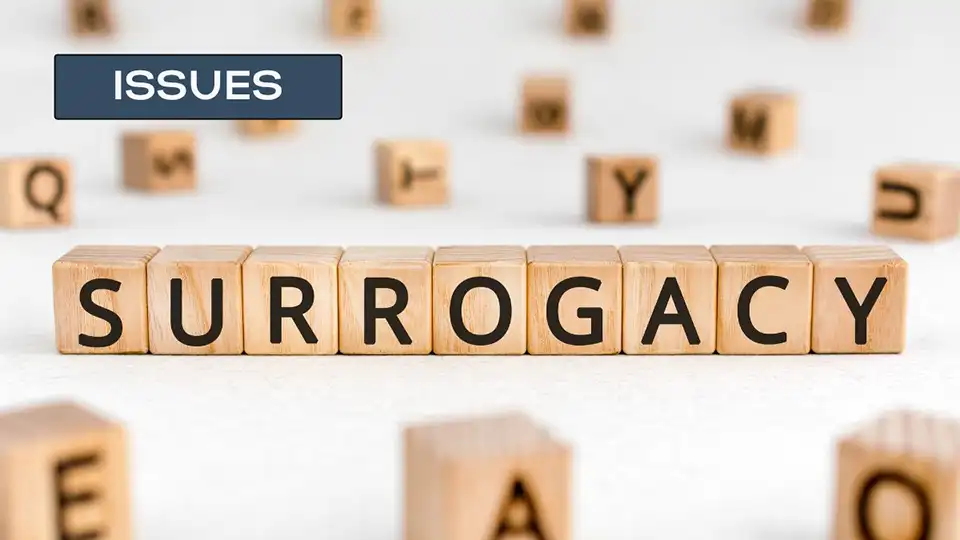We are constantly being contacted by concerned parents and being asked our opinion on the sex education curriculum in NZ schools.
We continue to warn ALL parents about:
* the new sexuality education guidelines which schools are now having professional development on,
* any programmes being run by Family Planning and Rainbow Youth, and the Mates & Dates programme.
The fact that the Ministry of Social Development and the Ministry of Education are funding and pushing this agenda with little parent involvement should concern us all. At the bottom of this page, we show you what you can do as a parent to protect your children.
1. ‘SEXUALITY’ EDUCATION
The Education Review Office should talk to parents first before issuing reports about sexuality education in schools (Sep 2018). We also question why words such as “abstinence”, “delay”, “moral”, and “marriage” have been left out of guidelines for school.
The review acknowledges that the best outcomes are achieved when trustees and school leaders consult with the school community, and the parents being able to have ‘meaningful input into the content and delivery’ of any programmes. The report also admitted that ‘very few schools reported to parents on sexuality education achievement. Consequently, evaluation of sexuality education provision, when it did occur, focused mostly on what had been delivered, rather than learning outcomes for students.’
The government is currently pursuing and promoting a curriculum where children are indoctrinated on ‘gender identity’ ideology and the harms of gender stereotypes, and given dangerous messages that they’re sexual from birth, that the proper time for sexual activity is when they feel ready, and that they have rights to pleasure, birth control, and abortion. Most schools along with the parents in the school community will rightly reject the extreme elements of the new sexuality education guidelines released earlier this year, and agree with us that resources should be targeted at parents to help them educate their own children. Primary school children as young as 5 will be indoctrinated with issues around ‘gender stereotypes and norms’, ‘sexuality and gender well-being’, ‘gender, sexuality and diversity’, and ‘gender and sexuality messages’. But most children that age – and older – simply want to play, eat and have fun. We should let children be children.
Parents will also object to these programmes targeted at children as young as five which undermine the role and values of parents, and resources which fail to take into account the emotional and physical development of each child and the values of that particular family.
READ: FAMILY PLANNING’S ‘SEXUALITY ROAD’ – WHAT EVERY PARENT SHOULD BE AWARE OF
Yes, pornography viewing by young people is absolutely a major concern for parents, but what parents are crying out for is resources and an understanding of the technology, the risks, and of how to protect their children. They want their children to know that it is wrong and to be discouraged from viewing it. It is not just a topic for discussion, devoid of any moral framework or direction.”
In a 2017 independent nationwide poll of 846 people undertaken by Curia Market Research, 4 out of 5 parents said they are confident of their ability to teach their own children about sex and sexuality issues, and 2/3’rds believe that parents should be dictating any school-based teaching, not the government or groups such as Family Planning and Rainbow Youth.
Studies show that the biggest protective factors for coping with puberty and sexual involvement are married parents, family values, parental supervision, and parental expectations for behaviour. What happens at home is the greatest determinant of the outcomes for the young person. There seems to be a basic and ironic assumption that parents know nothing about sex and that only Family Planning and Rainbow Youth do. This is a myth and is rejected by Kiwi parents.
Many schools will not work with Rainbow Youth because of their reputation – and rightly so.
READ OUR RESEARCH PAPER “R18: SEXUALITY EDUCATION IN NEW ZEALAND – A Critical Review“.
And watch our short episode of Family Matters below.
2. ‘GENDER’ EDUCATION
 Our children are being indoctrinated with the message ‘Gender refers to how you identify, someone can identify as male, female, in between, both, or neither.’ And the PPTA has told secondary schools that ‘Gender identity refers to what a person thinks of as their own gender, whether they think of themselves as a man or as a woman, irrespective of their biological sex.’ Schools are being bullied by government and advocacy groups in to adopting policies around uniforms, toilets, changing rooms, and sports teams rather than heeding the warnings and research of leading scholars and clinicians.
Our children are being indoctrinated with the message ‘Gender refers to how you identify, someone can identify as male, female, in between, both, or neither.’ And the PPTA has told secondary schools that ‘Gender identity refers to what a person thinks of as their own gender, whether they think of themselves as a man or as a woman, irrespective of their biological sex.’ Schools are being bullied by government and advocacy groups in to adopting policies around uniforms, toilets, changing rooms, and sports teams rather than heeding the warnings and research of leading scholars and clinicians.
Among the implications of the proposals around so-called ‘gender’ issues in schools is that sex-specific facilities, including changing rooms, showers, toilets or sports teams may no longer be directed on the basis of a child’s actual biological sex. Students could pick the toilet or changing room or sports team or uniform of the gender with which they identify at that time. They give the opportunity, for example, for male students who pretend to be transgender an alibi to use girls’ toilets, showers, and changing rooms. But the expectation of parents and the children themselves is to see students of the same sex in places like changing rooms and showers.
The ‘gender agenda’ will simply lead to confusion in schools. Ignoring biology is not a proper solution. What children really need is affirmation of their unique personality and appropriate treatment for their unhappiness and other presenting emotional issues.
READ: REPORT “BOYS GIRLS OTHER – Making Sense of the Confusing New World of Gender Identity”
And watch our short episode of Family Matters below.
Schools are keen to deal with the bullying issue but they are taking a full school community approach. Programmes like Inside Out are not inclusive, they are exclusive. They only focus on a very small group of students and ignore the far greater proportion of students who are bullied for the more common reasons of body image, racial background, disabilities, and academic success or failure. And of course the major prevalence of cyber-bullying. Unfortunately overweight students, students with acne or a speech impediment or a physical disability, or who are struggling academically, or students from a different culture don’t have a ‘lobby group’. Their cause is not politically sexy enough. But depression and suicide are also associated with these types of bullying.
But what is most ironic in all of this is that any student that doesn’t buy in to the group-think that is expected and dictated, even if it doesn’t affect the way they relate with other students, will immediately be bullied themselves with terms such as ‘homophobic’, ‘transphobic’, and ‘bigoted.’ Getting rid of all bullying is obviously not the key message of these groups.
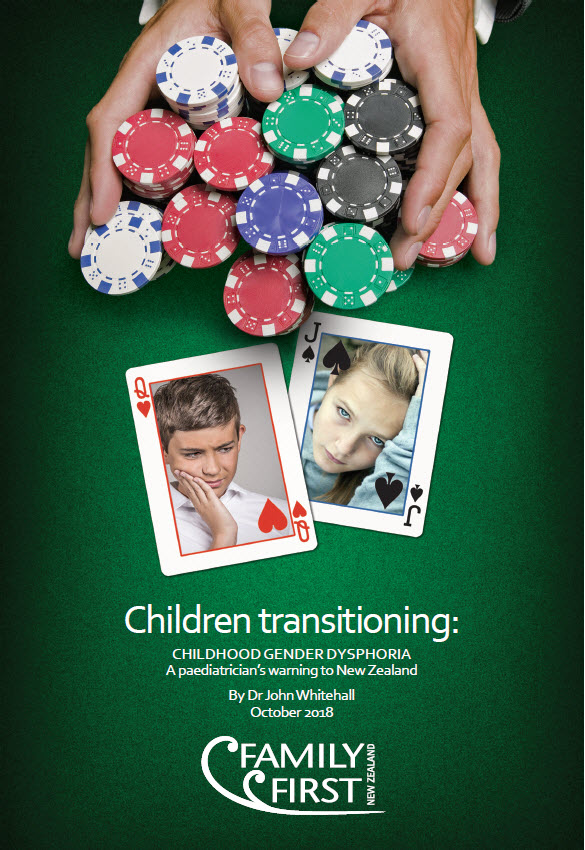 A recent report by an Australian paediatrician sent a strong warning to New Zealand that allowing children to choose their gender has no scientific evidence in medical literature to support the massive interventions of the medical pathway, and that the most vulnerable of children will be at particular risk. The report “Children Transitioning: Childhood gender dysphoria – A paediatrician’s warning to New Zealand”, written by Professor John Whitehall who is Foundation Chair and Professor of Paediatrics and Child Health at the University of Western Sydney, said that such a massive intervention into the minds and bodies of children could be expected to be based on a concrete body of scientific experimentation but, astonishingly, that is not the case. There is no biological basis to the confusion over gender: it has the hallmarks of a psychological fad, fanned by an uncritical, sensationalist media, given direction by private websites and even government funded programmes of ‘education’.
A recent report by an Australian paediatrician sent a strong warning to New Zealand that allowing children to choose their gender has no scientific evidence in medical literature to support the massive interventions of the medical pathway, and that the most vulnerable of children will be at particular risk. The report “Children Transitioning: Childhood gender dysphoria – A paediatrician’s warning to New Zealand”, written by Professor John Whitehall who is Foundation Chair and Professor of Paediatrics and Child Health at the University of Western Sydney, said that such a massive intervention into the minds and bodies of children could be expected to be based on a concrete body of scientific experimentation but, astonishingly, that is not the case. There is no biological basis to the confusion over gender: it has the hallmarks of a psychological fad, fanned by an uncritical, sensationalist media, given direction by private websites and even government funded programmes of ‘education’.
“Sadly, the most vulnerable of children appear to be at particular risk: numerous reviews reveal the majority of children confused about their gender also suffer from diagnosed mental disorders, such as depression and anxiety. Proponents of the medical pathway declare it is necessary to prevent suicide but, again, there is no evidence that gender dysphoria in children, per se, is associated with a higher risk of suicide. The accompanying mental and family disorders, however, are known to be associated with self-harm and, therefore, an affected child and family deserves close attention and compassion. Suicide may be prevented by compassionate ‘watchful waiting’ for the natural effects of puberty to orientate the child in the direction of its chromosomes, while applying standard therapy to the associated mental disorder. Society and governments are being led by so-called ‘expert opinion’. The medical pathway is based only on ideology, and claims of ‘success’ reflect beliefs, not science. Even worse, these beliefs are not negotiable: they have become coercive,” says Dr Whitehall.
3. “MATES & DATES”
We’ve also been asked about the new Mates and Dates programme in schools. While there is some good information around healthy relationships, the harms of drugs and alcohol, and keeping safe together, it is still disappointing that little consultation has been done with parents to find out what their role is and how can parents be equipped to be the ‘first teachers’. It is also concerning that it is linked closely to the Ministry’s Sexuality Education Curriculum, with a push on issues such as “identity, gender and sexuality”, including the use of the flawed and misleading ‘genderbread’ person.
The website says that “Mates & Dates is not a sex education programme” but then says “The sessions explore human sexuality and relationships, gender, and identity.” Draw your own conclusion!
READ: THE FULL ANALYSIS OF MATES & DATES – (YOU MAY BE SHOCKED)
4. NEW RESOURCE: RESPONDING TO THE TRANSGENDER ISSUE
* are you a parent, guardian or grandparent of a school student in NZ?
* do you know for sure what your children are being taught regarding whether they’re male or female, a boy or a girl?
* does your school allow students to use toilets, changing rooms & overnight accommodations, and play in sports teams, based on “gender identity”?
* does the school’s current sex education curricula cover “gender identity” or “transgender identification” at all? Have you reviewed those materials?
You may be shocked by what you find out – or what you can’t get information about when you ask! Even in primary schools.
And when you find out, how do you respond?
At the beginning of 2020, Family First NZ published a new resource “Responding To The Transgender Issue – Parent Resource Guide” designed to educate and assist parents as their children head back to school for the new year.
This Guide is designed to:
- help parents understand the basics of the transgender trend and its consequences
- understand the implications of transgender activism and “gender-inclusion” policies in schools
- explain parental rights, and give parents the tools to communicate with school leaders in order to protect their children’s rights to privacy
- encourage parents and school officials to work together to create a respectful school environment
- help parents advocate for common sense policies that will respect the dignity of all students
- help schools act with compassion toward everyone involved in the conversation
The Guide offers a wealth of constructive ideas for parents who want to work with their schools in a respectful manner to foster a genuinely inclusive climate based on truth and compassion.
Family First hopes that the Guide will help parents make a positive and effective case for policies that encourage acceptance and diversity in a way that communicates to every student they were born in the right body.
READ: “RESPONDING TO THE TRANSGENDER ISSUE – THE PARENT RESOURCE GUIDE”
5. SHODDY GOVT RESEARCH
What is also hugely concerning is that the basis for these programmes is based on what we can only call ‘shonky’ research. The Ministry of Education recently funded a study “Educating for diversity: an evaluation of a sexuality diversity workshop to address secondary school bullying.” by researchers connected with Rainbow Youth. The research is long on bias and short on hard data, including the following pitfalls:
- non-random sample – targeted at just two schools that obviously support the agenda. One school who refused to be involved rightly said that parents would be concerned about the content.
- there is no control group
- the study looks at the impact on students immediately after a one hour session. No study of the long term effects
- conflict of interest – researchers contracted by and advisers to Rainbow Youth
- no peer review
- Non-representative sample. 68% of the students were of Pacific ethnicity yet, according to the most recent Census, represent 7.4% of the population.
- The students all self-reported with no exterior objective checks. And they know they are participating in a major pro-diversity study, immediately after a session of indoctrination!
This study is light years away from any kind of representative sample. This is what real researchers call “snowball and convenience samples.” That is like what a poor grad student would use.
So we have a non-longitudinal design, inadequate sample size, biased sample selection, and lack of proper controls, funded by the government, and being touted as evidence that ‘it works and it’s needed!’.
Disturbing. The ‘agenda’ is more important than the effectiveness.
6. ARE THERE ANY PROGRAMMES WE DO RECOMMEND?

Glad you asked! Yes – we would recommend the Attitude programme for schools. Attitude – the youth education division of The Parenting Place (founded by Ian and Mary Grant) – has the objectives of encouraging mental and emotional resilience and helping prevent youth suicide, teen pregnancy, bullying, drug and alcohol abuse and low self-esteem. They also offer parent and child presentations. Why not check and see whether the Attitude programme is being used in your child’s school.
Nest Consulting also has some good resources – although they unfortunately use Mates & Dates.
SO WHAT CAN PARENTS DO?
Parental involvement is key, but parents are being excluded from the decision making process and development of most of the programmes we are warning you about, and that are being pushed in schools. That should concern all families.
We’ve written a summary of your legal rights HERE
But the bottom line is that:
* Schools MUST inform you in advance when these programmes are being presented, and
* You can withdraw your children from these sessions.
Parents/caregivers may write to the principal requesting to have their child excluded from any particular element of sexuality education in a health education programme. The principal is required to ensure that the student is excluded from the relevant tuition and that the student is supervised during that time.
We hope this information helps you make an informed decision. Most schools will rightly reject the extremist elements of this sexuality and gender material, but why not just make sure! Check whether your school Principal has read our sex education report and our gender report. We can send you a copy. Also remember that the Board of Trustees is a group of parents who are likely to share your concerns.
Unless you can absolutely guarantee that your school leadership is adopting a “first do no harm” policy with sexuality education (and Mindfulness, for that matter), is regularly consulting with you and other parents in the school community, AND can guarantee that groups like Family Planning and Rainbow Youth aren’t being allowed access to the classroom to push their propaganda, then we would recommend withdrawing your child. ‘Hoping for the best’ may not be worth the risk!
But ultimately, we believe parents should be able to make an informed choice on what’s best for their child – and not be forced to cowtow to ideology being pushed by the State which is flawed and, in many cases, harmful.
Please pass on this important information to other families.
NEW REPORT:
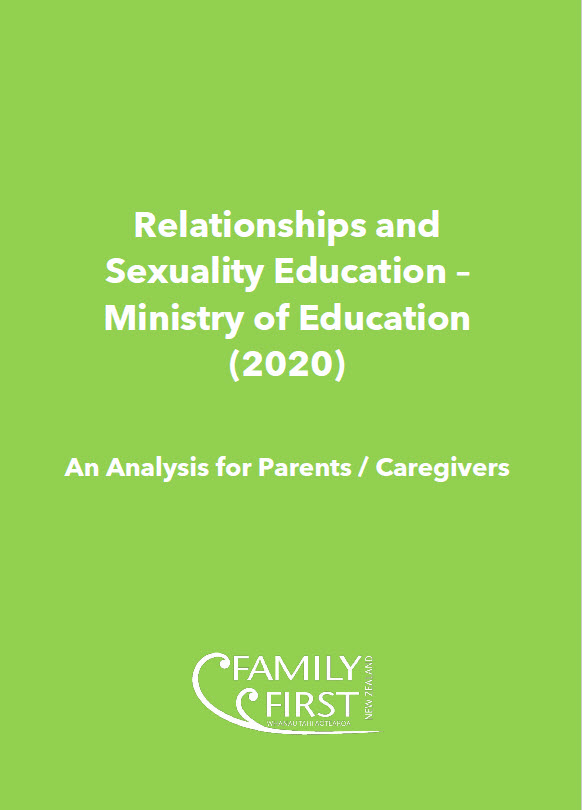 The Relationships and Sexuality Education Guidelines (or RSE for short) are a new set of proposals produced by the Ministry of Education and released in September last year. Despite being well-intentioned (with an aim to create more inclusive school environments and reduce bullying), these proposals are for the most part ideological, and while their content is portrayed as scientific, they have no basis in science. This should be concerning to all parents and caregivers.
The Relationships and Sexuality Education Guidelines (or RSE for short) are a new set of proposals produced by the Ministry of Education and released in September last year. Despite being well-intentioned (with an aim to create more inclusive school environments and reduce bullying), these proposals are for the most part ideological, and while their content is portrayed as scientific, they have no basis in science. This should be concerning to all parents and caregivers.
Primary age students are now being targeted with the confusing and dangerous message that changing sex is as easy as changing clothes, girls are discovering that biological boys have free access to their changing rooms, and the curriculum states that parents are able to be kept in the dark when their child has decided to identify as transgender during the school day.
In the new curriculum for primary age children, requirements include:
* students should be addressed by their preferred name and pronouns
* schools need to ensure that students can access toilets and changing rooms that align with their gender identification… trans students should not be required to use the gender-neutral toilet rather than male or female toilets of their choice
* challenge sex norms – for example, the assumption that sex characteristics at birth are always male or female
* challenge homophobia, transphobia, sexism, gender binaries… interrogate the ongoing effects of colonisation
* labelling uniform items by gender is an exclusionary practice
* In Science, consider how biological sex has been constructed
* In Social Science, research the #MeToo movement
(our emphasis added)
Our new report deals with the following issues:
• the new curriculum is rife with dangerous misinformation;
• it seeks to inject sexuality education into the rest of curriculum;
• it wants schools to implement controversial and divisive policies; and
• it puts schools at risk of becoming ideological and indoctrinatory spaces.
Read the short report – and see for yourself the agenda that the Ministry of Education is trying to push in your child’s school/s.

